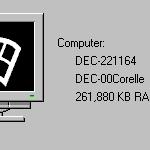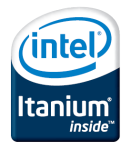I'd say the big delay to market kind of killed the Itanium before it was even born...
Maybe it's me but I have always thought it was the #1 reason that SGI got tripped up, cutting off it's MIPS stuff, and getting ready for the switch to Itanium, to only find out that it wasn't ready, and then it wouldn't be ready for YEARS while they had to scramble to try to keep the company afloat with some kind of faster MIPS.
On the Windows front, we always kept on hearing more and more about how great this 64bit computing would be, but again such massive delays just made it all feel like another vapor ware special from MS & Intel.
Not to mention when the Merced finally came out they were next to impossible to get, and we as customers were told to sit this round out as they frankly were not ready for production. Heck even the first version of Windows 2000 for the Itanium was lovingly called "Windows 2000 Advanced Server Limited Edition" which may sound great if you want to build an exclusive clubhouse, but it just said to us that this thing was more of a proof of concept then a real shipping product.
And then of course in 2003 the x64 stuff launched. It was really cool for Linux & BSD users as we suddenly moved all of our firewalls and internal stuff to the x64 and it was great. The custom in house stuff we did we luckily still have the source to, so we re-built and away we went. The big 'deal' was price, and part availability. And with the AMD stuff we really felt like that we had the ultimate path forwards & backwards. If we needed to run something old on any new machine we got, we could. Hell we can even run our MS-DOS product natively and all is well.
There is a lot to be said for hardware level comparability.
The whole time though we had kept on hearing from our tech contacts at Microsoft that they had a x64 version of Windows "in the wings" and they were just waiting for the right moment to release the product. The basic impression we had gotten from them was that if you didn't barge into the itanium market around 2001-2002 that you would be better off waiting for the x64 as they were already getting ready to scale back and drop the Itanium... Which is pretty evident in that windows 2003 was a 'full' release while the 2008 version is pretty scaled back. Hell you can't even have an Itanium dhcp server or active directory server. They clearly were phasing the product out. This is not even counting how they killed the workstation versions.
Which I guess now is no big surprise, esp once Windows on the x64 shipped, the Itanium version was dead.
It's just like how the MIPS/PPC/Alpha versions of Windows NT all died. Just show someone a RISC version of Windows, and the first thing they notice is that it looks *JUST LIKE THE i386*... But the hardware will cost a lot more. And they can do the exact thing. And that native applications are pretty dammed hard to get.
I mean even the whole 'native application' thing is moot for the Itanium as MS FINALLY SAW THE LIGHT OF CROSS COMPILERS... Mostly because they knew most devs would never buy Itaniums. But even that couldn't save the platform.
Instead it's always been, unless you need xyz app to run FASTER today, and you don't care how much it costs, because you need speed there hasn't been a compelling reason to buy a non x86 version of Windows. And the kicker is that Intel just kept on cranking out faster CPU's that you could constantly upgrade CPU's and get faster machines, as Intel had lept over the CISC performance "wall".
So I think the larger question about the Itanium's future is how much money is it making, vs how much it cost to make? I know they'll keep on making CPU's because of obligations to people that switched over to it, killing their own RISC cpu's, but eventually Intel will give up and move on. Even RedHat has given up on the Itanium.
I bet there is some pretty pissed off people at HP, as they have basically screwed themselves out of control of their own destiny... So where will they be in 5-10 years from now? Trying to fab their own Itaniums? Or porting to the x64..?
I just found out that IBM bought transitive, effectively killing that escape route. I had thought it would be kind of funny how they got all those great contracts getting people ONTO the Itanium (or apple from the PPC to the x64) but their next big thing would be getting people OFF the Itanium.
I guess someone ought to start funding Qemu.......
Ok I think that's enough rambling.
Maybe it's me but I have always thought it was the #1 reason that SGI got tripped up, cutting off it's MIPS stuff, and getting ready for the switch to Itanium, to only find out that it wasn't ready, and then it wouldn't be ready for YEARS while they had to scramble to try to keep the company afloat with some kind of faster MIPS.
On the Windows front, we always kept on hearing more and more about how great this 64bit computing would be, but again such massive delays just made it all feel like another vapor ware special from MS & Intel.
Not to mention when the Merced finally came out they were next to impossible to get, and we as customers were told to sit this round out as they frankly were not ready for production. Heck even the first version of Windows 2000 for the Itanium was lovingly called "Windows 2000 Advanced Server Limited Edition" which may sound great if you want to build an exclusive clubhouse, but it just said to us that this thing was more of a proof of concept then a real shipping product.
And then of course in 2003 the x64 stuff launched. It was really cool for Linux & BSD users as we suddenly moved all of our firewalls and internal stuff to the x64 and it was great. The custom in house stuff we did we luckily still have the source to, so we re-built and away we went. The big 'deal' was price, and part availability. And with the AMD stuff we really felt like that we had the ultimate path forwards & backwards. If we needed to run something old on any new machine we got, we could. Hell we can even run our MS-DOS product natively and all is well.
There is a lot to be said for hardware level comparability.
The whole time though we had kept on hearing from our tech contacts at Microsoft that they had a x64 version of Windows "in the wings" and they were just waiting for the right moment to release the product. The basic impression we had gotten from them was that if you didn't barge into the itanium market around 2001-2002 that you would be better off waiting for the x64 as they were already getting ready to scale back and drop the Itanium... Which is pretty evident in that windows 2003 was a 'full' release while the 2008 version is pretty scaled back. Hell you can't even have an Itanium dhcp server or active directory server. They clearly were phasing the product out. This is not even counting how they killed the workstation versions.
Which I guess now is no big surprise, esp once Windows on the x64 shipped, the Itanium version was dead.
It's just like how the MIPS/PPC/Alpha versions of Windows NT all died. Just show someone a RISC version of Windows, and the first thing they notice is that it looks *JUST LIKE THE i386*... But the hardware will cost a lot more. And they can do the exact thing. And that native applications are pretty dammed hard to get.
I mean even the whole 'native application' thing is moot for the Itanium as MS FINALLY SAW THE LIGHT OF CROSS COMPILERS... Mostly because they knew most devs would never buy Itaniums. But even that couldn't save the platform.
Instead it's always been, unless you need xyz app to run FASTER today, and you don't care how much it costs, because you need speed there hasn't been a compelling reason to buy a non x86 version of Windows. And the kicker is that Intel just kept on cranking out faster CPU's that you could constantly upgrade CPU's and get faster machines, as Intel had lept over the CISC performance "wall".
So I think the larger question about the Itanium's future is how much money is it making, vs how much it cost to make? I know they'll keep on making CPU's because of obligations to people that switched over to it, killing their own RISC cpu's, but eventually Intel will give up and move on. Even RedHat has given up on the Itanium.
I bet there is some pretty pissed off people at HP, as they have basically screwed themselves out of control of their own destiny... So where will they be in 5-10 years from now? Trying to fab their own Itaniums? Or porting to the x64..?
I just found out that IBM bought transitive, effectively killing that escape route. I had thought it would be kind of funny how they got all those great contracts getting people ONTO the Itanium (or apple from the PPC to the x64) but their next big thing would be getting people OFF the Itanium.
I guess someone ought to start funding Qemu.......
Ok I think that's enough rambling.
_________________
 O40-25Mhz!
O40-25Mhz!




















 okay, hold it - are you seriously suggesting that they would consider porting UX and VMS to AMD64?
okay, hold it - are you seriously suggesting that they would consider porting UX and VMS to AMD64?











